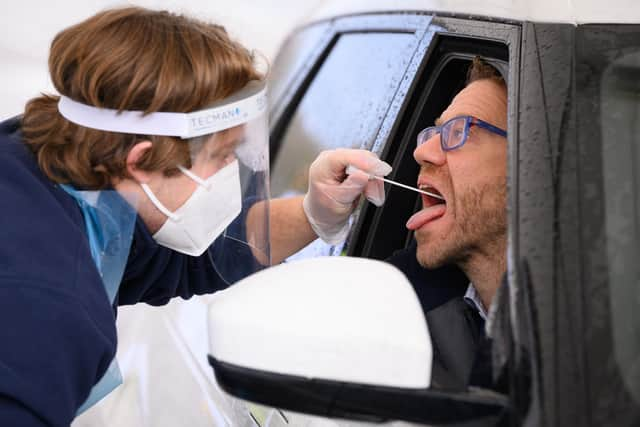Surge testing for Berkshire to curb spread of Indian Covid variant as community cases rise
and live on Freeview channel 276
Testing is being ramped up in areas of Berkshire to tackle the spread of the Covid variant, first identified in India.
The B.1.617.2 variant, often known as the Indian variant, has also been labelled Delta after letters of the Greek alphabet to avoid “stigma”.
Advertisement
Hide AdAdvertisement
Hide AdEveryone aged 12 and above in specific postcode areas of Reading and Wokingham will be offered PCR testing over the next two weeks.


Meradin Peachey, director of public health for Berkshire West, said cases are mainly among young people.
She told BBC Breakfast: “What’s happened in the last couple of weeks, especially in the last week, we’ve noticed that a lot of cases now coming through we can’t link to any travellers, which means we now have community transmission.”
Advertisement
Hide AdAdvertisement
Hide AdShe said a “big concern” is that continued spread could lead to more mutations.
She added: “If the variant spreads and becomes even more, it may mutate again and the big concern is that vaccines won’t work and that’s my big concern.
"We really want to get people tested and isolated if they’ve got the virus, stop the spread so that we can make sure the vaccination programme works.”
The extra testing and genomic sequencing is being offered in the RG1 3, RG1 5, RG1 6 and RG1 7 postcodes in Reading and in the Bulmershe and Whitegates, Evendons, Norreys, and Wescott areas of Wokingham, the Department of Health said.
Advertisement
Hide AdAdvertisement
Hide AdEveryone aged 12 and over who lives or works in these areas is strongly encouraged to take a PCR test, whether or not they have Covid symptoms.
It comes after the Department of Health announced the launch of additional testing and genomic sequencing in Bradford, Canterbury and Maidstone after cases of the Delta variant were identified.
On 3 June, Public Health England announced that the Delta variant is now believed to be dominant in the UK, with cases rising 79% from the previous week.
It means there might be two-week delay to the planned easing of restrictions in England on June 21 – which reportedly means pushing the ‘freedom date’ back until July 5.
The UK on 4 June recorded its highest number of new confirmed coronavirus cases – 6,238 – since late March, according to official figures.